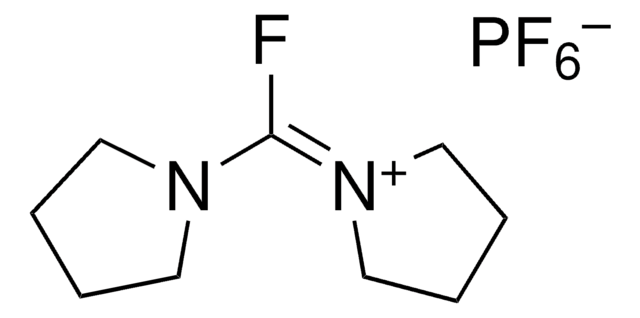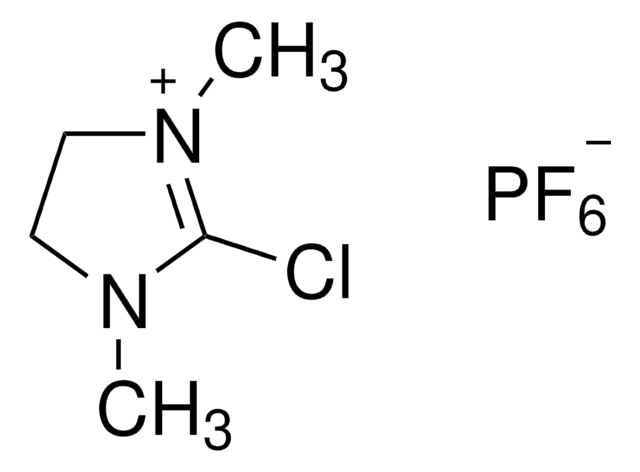529249
2-Chloro-1,3-dimethylimidazolinium chloride
for peptide synthesis
Synonym(s):
2-Chloro-4,5-dihydro-1,3-dimethyl-1H-imidazolium chloride, DMC
About This Item
Recommended Products
product name
2-Chloro-1,3-dimethylimidazolinium chloride,
form
crystalline
reaction suitability
reaction type: Coupling Reactions
mp
133-140 °C (lit.)
application(s)
peptide synthesis
SMILES string
[Cl-].CN1CC[N+](C)=C1Cl
InChI
1S/C5H10ClN2.ClH/c1-7-3-4-8(2)5(7)6;/h3-4H2,1-2H3;1H/q+1;/p-1
InChI key
AEBBXVHGVADBHA-UHFFFAOYSA-M
Application
Tagged glucose as an intermediate in the synthesis of branched oligosaccharides
Fluorescent chemosensors
1,2-Diamines as inhibitors of co-activator associated arginine methyltransferase 1
Allosteric glucokinase activators
Reactant for synthesis of:
Organic azides from primary amines
Reagent for aza-Henry reactions
Signal Word
Warning
Hazard Statements
Precautionary Statements
Hazard Classifications
Eye Irrit. 2 - Skin Irrit. 2 - STOT SE 3
Target Organs
Respiratory system
Storage Class Code
11 - Combustible Solids
WGK
WGK 3
Flash Point(F)
Not applicable
Flash Point(C)
Not applicable
Personal Protective Equipment
Certificates of Analysis (COA)
Search for Certificates of Analysis (COA) by entering the products Lot/Batch Number. Lot and Batch Numbers can be found on a product’s label following the words ‘Lot’ or ‘Batch’.
Already Own This Product?
Find documentation for the products that you have recently purchased in the Document Library.
Customers Also Viewed
Articles
N-Acylimidazoles and carbonylimidazoles are reactive intermediates used for amino compound acylation, surpassing DCC as coupling reagents.
N-Acylimidazoles and carbonylimidazoles are reactive intermediates used for amino compound acylation, surpassing DCC as coupling reagents.
N-Acylimidazoles and carbonylimidazoles are reactive intermediates used for amino compound acylation, surpassing DCC as coupling reagents.
N-Acylimidazoles and carbonylimidazoles are reactive intermediates used for amino compound acylation, surpassing DCC as coupling reagents.
Our team of scientists has experience in all areas of research including Life Science, Material Science, Chemical Synthesis, Chromatography, Analytical and many others.
Contact Technical Service














